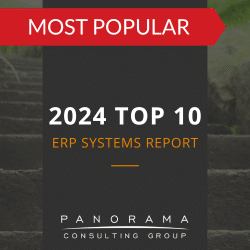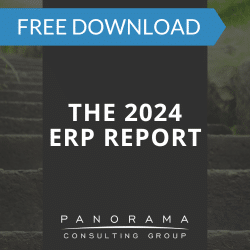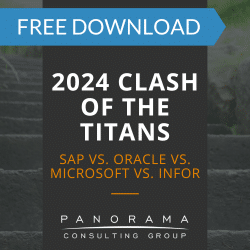Master data is an important but often overlooked aspect of an ERP implementation (or any other type of enterprise software project). Not only does your master data need to be cleansed and migrated to the new system, but you need to define how you will manage it going forward.
If you’re considering selecting a CRM system, manufacturing ERP system, or some other type of enterprise software, it’s time to start thinking about master data management.
What is master data management (MDM)? While you might have heard of MDM systems, the real secret to reliable data is in your MDM strategy. Regardless of whether you use an MDM system to cleanse and standardize your data, the goal is to make your master data usable.
When you develop the right strategy, your new ERP system will be on its way to providing reliable business intelligence.
What is Master Data?
Before we dive into how master data management can help you take control of your business data, let’s back up a little.
Master data is a single source of business data used across multiple systems and applications. Examples include:
- People (employees, suppliers, partners, customers, vendors)
- Places (offices, locations)
- Things (products, resources, assets, formulas)
This is in contrast to transactional data, which are “events” that happened at a certain point in time. Examples include:
- Customer Orders
- Purchase Orders
- Invoices
- Shop floor jobs
Software Selection & Process Improvement Case Study
In helping the client get its project back on track, one of our primary focus areas was decreasing their customization needs by improving their processes to align with the system's best practices.
What is Master Data Management?
Master data management is a set of processes and technologies that help organizations create, maintain, and manage a single, accurate view of their master data across all systems and applications.
Think about the number of different systems your organization has. This might include anything from an ERP system to an SCM system to a specialized point solution.
Now, think about how many individual users interact with each of these systems.
That’s a lot of interactions. It’s no surprise that data can become murky over time. Here are some of the most common issues that MDM can mitigate:
- Duplicate records
- Out-of-date information
- Contradictory information
- Lack of standardization
Overall, master data management can help you maintain a single source of truth.
For example, if the same customer record is entered into multiple applications by different teams, and the information is inconsistent, you might not notice unless you had an MDM strategy.
As part of this strategy, many companies implement MDM systems that automatically merge records and reconcile duplication whenever fields don’t line up.
Data Reliability Means Better Business Decisions
The ultimate outputs of master data management are a master data record and a data governance strategy that ensures data stays clean as you add new data to the master list.
For instance, an organization might develop governance around the approval process for new products or suppliers.
When you formalize the data capture and management process, your enterprise software will be able to provide reliable insights. As a result, employees will be able to make more informed business decisions, regarding pricing strategies, optimal inventory levels, ideal shipping routes, and more.
Reliable Master Data is Essential for AI Adoption
Are you considering an ERP system with AI capabilities?
AI and machine learning algorithms are trained on data, so the quality of your data has a direct impact on the performance of these algorithms.
For example, if you want to train an algorithm to predict customer churn, you’d first have to focus on master data management and create a single view of your customer data.
Learn More About Master Data Management
Your executives and other stakeholders need access to relevant, accurate, and timely insights. New ERP software can enable these insights, but only if you focus on master data management from the outset.
What is master data management? To learn more about MDM, contact our ERP consultants below.














